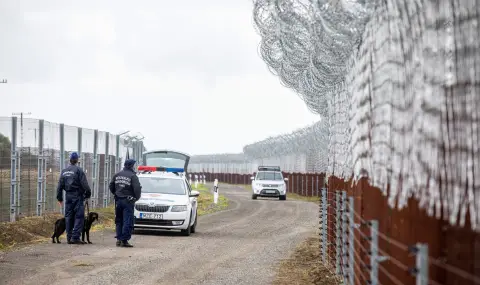From Monday, Germany introduced controls at all its borders to detect illegal migrants and asylum seekers. As Chancellor Olaf Scholz stated before the Bundestag, this change in the country's migration policy represents the “biggest turnaround” in asylum policy.
The CDU insisted on even more radical measures
However, there is no direct return of asylum seekers to Austria, Poland or France. The largest opposition faction insisted on this – that of the CDU/CSU. In the opinion of the Federal Minister of the Interior, Nancy Fazer, such actions would violate the current national legislation on the granting of asylum and the so-called. Dublin Regulation applicable in the EU.
For returning control of all German land borders, Chancellor Scholz was applauded by Hungarian Prime Minister Viktor Orbán, who has been trying to stop all migration to Hungary for years. With “Welcome to the club!“ Orbán welcomed Scholz to the X platform under the hashtag StopMigration. However, the national-conservative and far-right Hungarian Prime Minister did not specify which club it was.
Hungary violates EU law
When it comes to asylum policy, Orban is the only member of the “Stop Migration” club. in the EU. For years, Hungary has regularly and systematically violated European law. Since 2015, the Court of Justice of the European Union has ruled on this issue several times. Recently, in June, the court imposed a fine of 200 million euros on the government in Budapest, because Viktor Orbán refused to comply with a decision from last year.
The Court of Justice of the European Union had ordered Hungary to change its practice of accepting asylum applications only at the Hungarian embassies in Serbia or Ukraine. Under EU law, asylum seekers must be able to submit their applications directly at the border. Viktor Orbán does not accept the decision of the court in Luxembourg and also refuses to pay the fine due. Therefore, probably as early as next week, the European Commission (EC) will reduce payments to Hungary from the EU budget. According to the decision of the Court of the EU, the fine is one million euros per day.
Orbán wants national powers
During a debate in Italy last week, Viktor Orbán insisted that Hungary should have the right to decide its own immigration and asylum policy. “Some things should not be decided in Brussels. Who can determine whether a country should live with migrants or not? This should be decided by the people and the elected leaders, not the imperialist center for forced integration,” said Viktor Orbán, who is also currently the President of the Council of the EU. However, Europe's longest-serving head of government, whose country has significant deficits in the rule of law, misses the fact that asylum policy is subject only to European, not national, legislation.
Hungary has hermetically closed its border with Serbia, which is also the external border of the EU - with fences and barbed wire. On “no man's land” along the border it temporarily set up transit zones where asylum seekers were sometimes detained for months – while the procedure lasts. The Court of the European Union also declared this practice illegal and terminated it. However, Viktor Orbán achieved his goal: in 2024, Hungary granted asylum to five people, and currently there are 15 pending asylum cases.
A clear trend: migrants are avoiding Hungary
As a result, the number of asylum seekers arriving in Hungary has dropped dramatically – something that would also make Chancellor Olaf Scholz very happy. In May of this year 365,000 asylum applications were being processed in Germany.
"We should be able to choose who comes to Germany. I make that quite clear here. And so it is also important to manage illegal migration, to reduce the number of those who come to Germany illegally. And also to repatriate those who cannot stay," said Olaf Scholz in a speech to the Bundestag (11.9). The trend is clear – politics is clearly moving towards what Hungary has long insisted on – more control and fewer migrants allowed into the country. Although the means by which it will be achieved are not comparable.
Transfer to the outer borders
At the European level, member states (including Hungary) have adopted a “pact on migration”, which according to the responsible European Commissioner Ilva Johansson, aims to reduce the number of arrivals and increase the number of returns and deportations. In addition, asylum procedures should be accelerated and, if possible, relocated at the EU's external borders to closed reception centers similar to the Hungarian transit zones.
The fundamental right to asylum should remain guaranteed. Overburdened countries of first registration for migrants, such as Greece or Italy, should be allowed to transfer asylum seekers to other EU countries. And because this requires solidarity and acceptance of people in need of protection, Hungary rejects the migration pact and refuses to implement it legally. Prime Minister Viktor Orbán definitely does not want to be part of this “club” of the EU.
What's more: Orbán is threatening to load the few asylum seekers or refugees who do make it to Hungary onto buses and pour them into the European institutions in Brussels. On Tuesday, the EC strongly criticized this threat as a violation of all rules. Germany's new border control is also drawing criticism. Polish Prime Minister Donald Tusk called the possible return of migrants to Poland “unacceptable”. Austrian Chancellor Nehammer announced that his country would also return migrants if necessary. However, according to him, the German interpretation of the right to grant asylum is quite strange.
Author: Bernd Riegert
